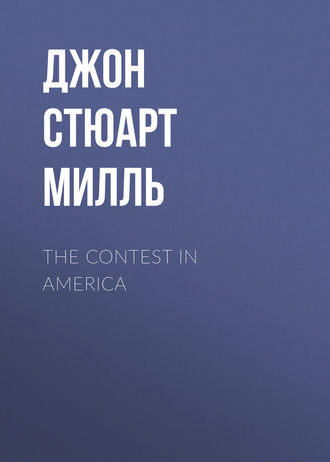
Джон Стюарт Милль
The Contest in America
If, however, the purposes of the North may be doubted or misunderstood, there is at least no question as to those of the South. They make no concealment of their principles. As long as they were allowed to direct all the policy of the Union; to break through compromise after compromise, encroach step after step, until they reached the pitch of claiming a right to carry slave property into the Free States, and, in opposition to the laws of those States, hold it as property there; so long, they were willing to remain in the Union. The moment a President was elected of whom it was inferred from his opinions, not that he would take any measures against slavery where it exists, but that he would oppose its establishment where it exists not, – that moment they broke loose from what was, at least, a very solemn contract, and formed themselves into a Confederation professing as its fundamental principle not merely the perpetuation, but the indefinite extension of slavery. And the doctrine is loudly preached through the new Republic, that slavery, whether black or white, is a good in itself, and the proper condition of the working classes everywhere.
Let me, in a few words, remind the reader what sort of a thing this is, which the white oligarchy of the South have banded themselves together to propagate and establish, if they could, universally. When it is wished to describe any portion of the human race as in the lowest state of debasement, and under the most cruel oppression, in which it is possible for human beings to live, they are compared to slaves. When words are sought by which to stigmatize the most odious despotism, exercised in the most odious manner, and all other comparisons are found inadequate, the despots are said to be like slave-masters, or slave-drivers. What, by a rhetorical license, the worst oppressors of the human race, by way of stamping on them the most hateful character possible, are said to be, these men, in very truth, are. I do not mean that all of them are hateful personally, any more than all the Inquisitors, or all the buccaneers. But the position which they occupy, and the abstract excellence of which they are in arms to vindicate, is that which the united voice of mankind habitually selects as the type of all hateful qualities. I will not bandy chicanery about the more or less of stripes or other torments which are daily requisite to keep the machine in working order, nor discuss whether the Legrees or the St. Clairs are more numerous among the slave-owners of the Southern States. The broad facts of the case suffice. One fact is enough. There are, Heaven knows, vicious and tyrannical institutions in ample abundance on the earth. But this institution is the only one of them all which requires, to keep it going, that human beings should be burnt alive. The calm and dispassionate Mr. Olmsted affirms that there has not been a single year, for many years past, in which this horror is not known to have been perpetrated in some part or other of the South. And not upon negroes only; the Edinburgh Review, in a recent number, gave the hideous details of the burning alive of an unfortunate Northern huckster by Lynch law, on mere suspicion of having aided in the escape of a slave. What must American slavery be, if deeds like these are necessary under it? – and if they are not necessary and are yet done, is not the evidence against slavery still more damning? The South are in rebellion not for simple slavery; they are in rebellion for the right of burning human creatures alive.
But we are told, by a strange misapplication of a true principle, that the South had a right to separate; that their separation ought to have been consented to, the moment they showed themselves ready to fight for it; and that the North, in resisting it, are committing the same error and wrong which England committed in opposing the original separation of the thirteen colonies. This is carrying the doctrine of the sacred right of insurrection rather far. It is wonderful how easy and liberal and complying people can be in other people's concerns. Because they are willing to surrender their own past, and have no objection to join in reprobation of their great-grandfathers, they never put themselves the question what they themselves would do in circumstances far less trying, under far less pressure of real national calamity. Would those who profess these ardent revolutionary principles consent to their being applied to Ireland, or India, or the Ionian Islands. How have they treated those who did attempt so to apply them? But the case can dispense with any mere argumentum ad hominem. I am not frightened at the word rebellion. I do not scruple to say that I have sympathized more or less ardently with most of the rebellions, successful and unsuccessful, which have taken place in my time. But I certainly never conceived that there was a sufficient title to my sympathy in the mere fact of being a rebel; that the act of taking arms against one's fellow-citizens was so meritorious in itself, was so completely its own justification, that no question need be asked concerning the motive. It seems to me a strange doctrine that the most serious and responsible of all human acts imposes no obligation on those who do it of showing that they have a real grievance; that those who rebel for the power of oppressing others, exercise as sacred a right as those who do the same thing to resist oppression practised upon themselves. Neither rebellion nor any other act which affects the interests of others, is sufficiently legitimated by the mere will to do it. Secession may be laudable, and so may any other kind of insurrection; but it may also be an enormous crime. It is the one or the other, according to the object and the provocation. And if there ever was an object which, by its bare announcement, stamped rebels against a particular community as enemies of mankind, it is the one professed by the South. Their right to separate is the right which Cartouche or Turpin would have had to secede from their respective countries, because the laws of those countries would not suffer them to rob and murder on the highway. The only real difference is that the present rebels are more powerful than Cartouche or Turpin, and may possibly be able to effect their iniquitous purpose.
Suppose, however, for the sake of argument, that the mere will to separate were in this case, or in any case, a sufficient ground for separation, I beg to be informed whose will? The will of any knot of men who, by fair means or foul, by usurpation, terrorism, or fraud, have got the reins of government into their hands? If the inmates of Parkhurst Prison were to get possession of the Isle of Wight, occupy its military positions, enlist one part of its inhabitants in their own ranks, set the remainder of them to work in chain gangs, and declare themselves independent, ought their recognition by the British Government to be an immediate consequence? Before admitting the authority of any persons, as organs of the will of the people, to dispose of the whole political existence of a country, I ask to see whether their credentials are from the whole, or only from a part. And first, it is necessary to ask, Have the slaves been consulted? Has their will been counted as any part in the estimate of collective volition? They are a part of the population. However natural in the country itself, it is rather cool in English writers who talk so glibly of the ten millions (I believe there are only eight), to pass over the very existence of four millions who must abhor the idea of separation. Remember, we consider them to be human beings, entitled to human rights. Nor can it be doubted that the mere fact of belonging to a Union in some parts of which slavery is reprobated, is some alleviation of their condition, if only as regards future probabilities. But even of the white population, it is questionable if there was in the beginning a majority for secession anywhere but in South Carolina. Though the thing was pre-determined, and most of the States committed by their public authorities before the people were called on to vote; though in taking the votes terrorism in many places reigned triumphant; yet even so, in several of the States, secession was carried only by narrow majorities. In some the authorities have not dared to publish the numbers; in some it is asserted that no vote has ever been taken. Further (as was pointed out in an admirable letter by Mr. Carey), the Slave States are intersected in the middle, from their northern frontier almost to the Gulf of Mexico, by a country of free labor – the mountain region of the Alleghanies and their dependencies, forming parts of Virginia, North Carolina, Tennessee, Georgia, and Alabama, in which, from the nature of the climate and of the agricultural and mining industry, slavery to any material extent never did, and never will, exist. This mountain zone is peopled by ardent friends of the Union. Could the Union abandon them, without even an effort, to be dealt with at the pleasure of an exasperated slave-owning oligarchy? Could it abandon the Germans who, in Western Texas, have made so meritorious a commencement of growing cotton on the borders of the Mexican Gulf by free labor? Were the right of the slave-owners to secede ever so clear, they have no right to carry these with them; unless allegiance is a mere question of local proximity, and my next neighbor, if I am a stronger man, can be compelled to follow me in any lawless vagaries I choose to indulge.






